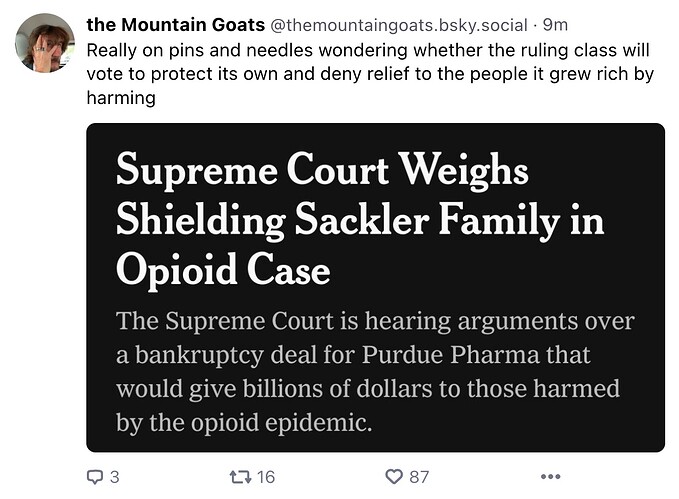Thomas should just note when he isn’t recusing and just auto recuse unless extraordinary circumstances.
Lots of info on Leonard Leo.
Another Thomas tidbit in the article is that Leo arranged for mega donors to have a private meeting with Thomas in the Supreme Court chambers. When asked about Leo just says he’s proud to let Thomas, one of the greatest constitutional scholars talk about the constitution.
Sounds like a sex for money scheme.
Looking pretty good for my side in my bet with @clovis8.
I out close to zero stock in these tea reading articles trying to guess the outcome based on oral argument. They are wrong more than they are right.
“Left unclear was how the code will be enforced.”
I like how that sentence is its own paragraph

Corporations are people so obviously as long as the corporation is punished justice is served. ![]()
Gonna be reminiscent of the 2016 McDonnell v US case where they decided 9-0 that bribery is in fact legal.
WASHINGTON —
The Supreme Court justices sounded ready on Monday to uphold a huge bankruptcy deal that includes $6 billion from the Sackler family to help the nation and tens of thousands of victims recover from the opioid crisis.
Most of the justices said the deal looked to be the best possible outcome, even though it gave the Sacklers a shield from future lawsuits.
Most of their questions were critical of the Biden administration’s claim that the deal should not go forward because the Sacklers are not bankrupt.
Justice Brett M. Kavanaugh said tens of thousands of families directly affected by OxyContin “overwhelmingly approve of this settlement,” he told a Justice Department lawyer. “The federal government which has no stake in this is telling the families we will not give you a prompt payment and to allow this money to go to the states.”
Justice Elena Kagan agreed and said the federal government seeks “to blow up the deal” that has the overwhelming support from all sides. “They say this is the best deal they can get… And they say if this deal is blown up, they may end up with nothing.”
I mean, I’m just some asshole, but is the Supreme Court supposed to decide if this is a good deal or whether the law allows it? I thought, like a chump, it was the latter.
The purpose of bankruptcy law is to get the best deal for the creditors, even though it’s usually not 100% of the debt. Creditors taking a lower amount to get it faster is common.
This is very clear, and well articulated by lunatic 5th Circuit Judge Kyle Duncan at a Stanford event earlier this year:
“Do you think that considering the ethical implications of your decisions is outside the scope of your work?” [a student] asked. When Duncan pretended not to understand and started riffing about judicial ethics, she tried again, asking whether he considers “fairness” when writing his opinions.
Again, Duncan’s answer makes clear that he is contemptuous of the very idea. “You mean, do I sit back and sort of say, ‘Well, what is fair? What is fair? What do I think is fair?’” he said. “The answer is, judges aren’t supposed to engage in some sort of cosmic fairness balancing, because we have elected officials to do such things!”
IMPORTANT EXCEPTION TO THIS RULE: IT DOES NOT APPLY TO POLICIES THAT THE JUDGES DON’T LIKE.
In the context of student loan forgiveness, fairness matters a great deal:
This assessment, of course, might come as news to Duncan’s fellow Republicans on the U.S. Supreme Court, who spent most of oral argument in the student debt forgiveness cases last month pondering whether President Joe Biden’s plan is, to use a technical term, Too Unfair To Be Legal. Justice Neil Gorsuch wrung his hands about the plan’s “costs to other persons in terms of fairness”; at least three times, Justice Samuel Alito demanded that the government explain, to his subjective satisfaction, why the plan is “fair.” Chief Justice John Roberts, a vocal skeptic of fairness when it doesn’t suit his interests, asked Solicitor General Elizabeth Prelogar why fairness “isn’t…a factor that should enter into our consideration,” which is the way you phrase a question when you’ve already decided on the answer.
Sure, fine, but the question is whether a bankruptcy settlement can release non-bankrupt 3rd parties from liability.
Alex Jones lawyers are paying attention.
Not even third parties. It’s can the owner of a company be completely shielded from any and all liability no matter how illegal the actions of the corporation are.
